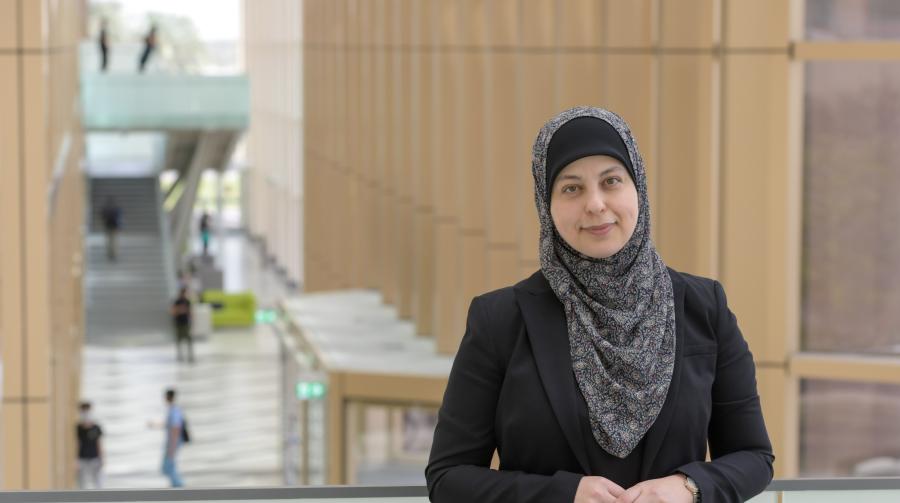- About
- Admissions
- Study at AUS
- Prospective Students
- Bachelor's Degrees
- Master's Degrees
- Doctoral Degrees
- Admission Publications
- International Students
- Contact Admissions
- Grants and Scholarships
- Sponsorship Liaison Services
- Testing Center
- New Undergraduate Student Guide
- Undergraduate Orientation
- New Graduate Student Guide
- Graduate Orientation
- File Completion
- Payment Guide
- Students with Disabilities
- Executive and Continuing Education
- Academics
- Life at AUS
- Research
- Publications
- Contact Us
- Apply Now
- .

AUS top-cited researcher harnesses green tech to produce clean energy and potable water
Dr. Amani Al-Othman, Associate Professor in Chemical Engineering at American University of Sharjah, is working on developing membrane materials for energy production and water purification technology.
In her work, Dr. Al-Othman addresses the global need for sustainable energy sources by conducting fuel cell technology research, focusing on proton exchange membrane (PEM) fuel cell technology. This electrochemical energy conversion technology is a highly efficient way to directly convert the chemical energy stored in fuel to electricity with low to zero greenhouse gas emission.
She is currently focused on cleaner energy production and the development of membranes that address this energy problem.
“The advancement in clean energy production relies on the development of new materials (membranes), which lowers costs, and enhances performance and durability. The current fuel cell membrane technology, for example, faces various drawbacks related to their instability, high cost and operating temperatures,” said Dr. Al-Othman.
She added: “We are creating in-house membranes that can be modified to enhance energy production. Current electricity-producing fuel cells operate at temperatures that are lower than 100 degrees Celsuis. Water is a byproduct of this energy production process, which on the long run can accumulate in liquid form inside the cell. This requires us to stop the fuel cells to remove the water regularly. What we are looking at producing at AUS is fuel cells that can operate at higher temperatures allowing the water to evaporate. My research activities at AUS will enhance the existing research profile in clean energy production, while also supporting the UAE’s Vision 2021 on Sustainable Development and Infrastructure”
Dr. Al-Othman is also looking at using membranes to purify water from chemical contamination that current conventional purification systems cannot achieve.
“Membranes are used in water purification. However, chemical contaminants continue to exist, like traces of medications including antibiotics as an example. Current systems do not completely remove these contaminants and when we drink the purified water, these contaminants accumulate in our bodies. In my lab, we are looking at alternatives to remove these contaminants. One example is a membrane modification that we successfully produced that removed 99.7 percent of antibiotic traces in water at a lower cost. We are in the process of publishing the research on that, and the next step is to further test this by scaling up the process and running tests on larger volumes of water,” she said.
Dr. Al-Othman’s research work was published in some of the most prestigious scientific, indexed and peer-reviewed journals such as the International Journal of Hydrogen Energy, Renewable and Sustainable Energy Review, the Journal of Fuel, the Journal of Energy, and the Journal of Science of the Total Environment.
She also has a background in materials engineering from McGill University and is using her multidisciplinary background and experience in her research. This has allowed her to diversify her work and become actively involved nationally and internationally in several research areas with Fraunhofer Institute for Solar Energy Systems in Germany, University of Wisconsin in the US, Deakin University in Australia, University of Electronic Science and Technology of China, Universiti Teknologi PETRONAS in Malaysia, Qatar University, Khalifa University, UAE University, and the University of Sharjah.
The highly cited researcher published more than 50 Research papers between 2018 and 2022 alone. “I have always been passionate about the field of energy. With the ongoing concerns on the depletion of fossil fuels and the excessive greenhouse gasses emissions, many research activities aim to develop clean energy sources. My background is in chemical engineering, and I pursued my PhD studies in energy at the University of Ottawa where I specialized in fuel cells. I also teach energy-related courses at AUS. So, it seems very natural for me to be in this field,” she said.
Dr. Al-Othman also believes in the importance of engaging students in her research work, noting that such opportunities are necessary to expand their knowledge and enrich their academic and research experience.
“My work on membranes and composite materials has provided multiple opportunities for AUS students at the graduate and undergraduate levels to be involved in state-of-the-art research. I was also privileged to have published with many undergraduate and graduate AUS students in well-reputed books and journals. I am also a mentor at the AUS-DuPont student competition to develop technologies that promote safety and protection of the community. The project involves a close cooperation between DuPont and AUS students to solve one of the existing environmental problems in using polymer membranes for removing emerging contaminants from water,” she said.
Chemical engineering is a discipline that impacts numerous areas of technology by occupying a unique position at the interface between materials, molecular sciences and engineering. Intimately linked with the basic subjects of chemistry, mathematics, physics and biology, chemical engineering offers unparalleled opportunities to design, develop and operate industrial processes that make great contributions to the technological infrastructure of modern society. AUS offers a bachelor of science and a master of science in chemical engineering offering students the opportunity to pursue minor specialties in vital areas such as petroleum engineering, renewable energy, environmental and water engineering, engineering management and biomedical engineering.
For more information about the chemical engineering program at AUS, visit www.aus.edu/cen/department-of-chemical-engineering.

